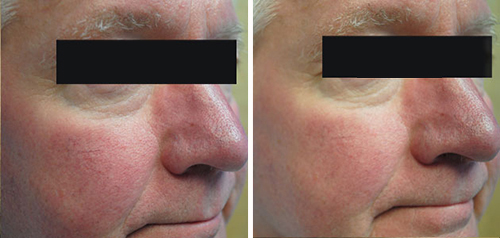Rosacea is an often distressing although benign skin condition that causes the face to flush and look red. It can be associated with facial bumps that resemble acne. It usually involves the cheeks, nose, chin, and forehead. Less often it can involve the eyelids, neck, ears, and chest. As time goes on facial capillaries dilate and become discrete engorged vessels. These are most visible on the mid-cheek, chin, and nose areas. Other symptoms may include stinging, burning, dry skin, a bulbous swollen nose, broken blood vessels, large pores, and visual problems.
Interestingly, the prevalence of rosacea in the United States varies by demographic region. The highest prevalence, which is about 10% of adult population, is in New England with the lowest prevalence in Hawaii, New Mexico, Mississippi and Oklahoma.
Although there is no known absolute cause, there are associated risk factors including genetics, vascular disease, infection, skin type (lighter skin types are often affected more), age, sex, medications and tobacco use. Flareups can be affected by hormonal changes, food intolerances, weather changes, and stress.
Diagnosis is often made by history and physical examination alone. Occasionally cultures of ocular secretions might be necessary. Treatment often consists of avoidance of aggravating factors, repairing damaged porous and dry skin with appropriate topicals, antibiotics, vasoconstricting topical and oral medications, and finally lasers. Lasers have two functions. First, they can be used to reduce sebaceous gland activity and help resolve acne-like eruptions. Second, they can be used to coagulate and close facial vessels resulting in a significant reduction in facial redness. In general, however, there is no absolute cure but the condition can be controlled. Long-term maintenance therapy, including sun protection, usually is needed to keep rosacea from progressing.
Doctor Nightingale has twenty years of experience treating patients with rosacea using lasers and light devices. If you would like more information about rosacea and treatment options available at our clinics, then please call Doctor Nightingale and schedule a consultation.

